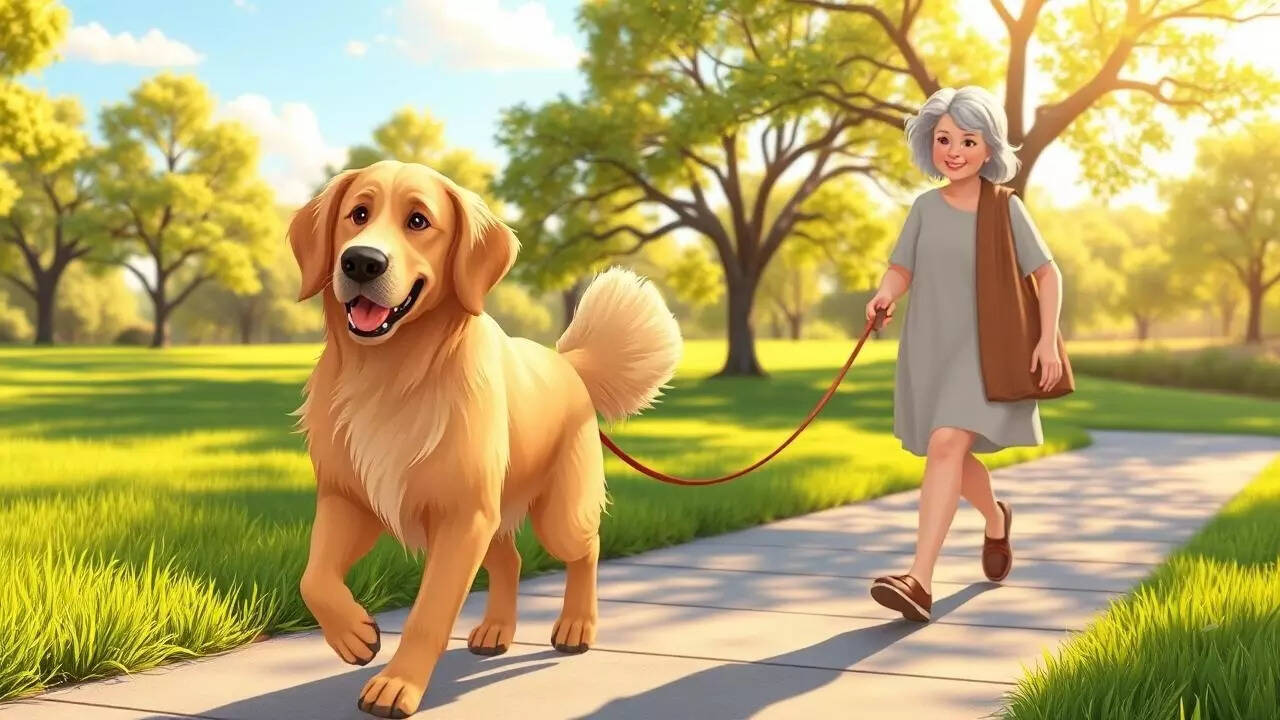How To Care For Senior Dogs At Home; A Complete Guide To Ageing Gracefully
As dogs grow older, their needs change — physically, emotionally, and medically. Senior dogs deserve the same energy, love, and attention they offered in their younger years. Providing the right care ensures they remain comfortable, active, and content in their golden years. According to veterinarians, small and medium breeds are considered senior from around seven years of age, while larger breeds reach that stage a bit earlier. Understanding their changing needs and adapting your routine accordingly is key to ensuring your ageing pet enjoys a high quality of life at home.
Experts suggest observing subtle changes closely. Increased thirst, sudden weight loss, or difficulty climbing stairs could point to underlying health issues like arthritis, diabetes, or kidney problems. Regular veterinary check-ups become crucial at this stage to detect and manage such conditions early.
It’s important to monitor portion sizes to prevent obesity, which can worsen age-related conditions like arthritis. Omega-3 fatty acids, found in fish oil, can help maintain healthy joints and a shiny coat. If your dog has dental issues, consider switching to softer food or adding broth to dry kibble to make it easier to chew.
Always ensure fresh water is available, as senior dogs can become dehydrated quickly. Avoid giving table scraps or human food, which can upset their digestion or cause unwanted weight gain.
At home, make their surroundings comfortable and accessible. Use non-slip mats to prevent falls, and provide a soft, supportive bed that cushions their joints. Avoid forcing older dogs to climb stairs or jump onto furniture. According to experts, regular stretching and light play can also help maintain circulation and mobility.
Vaccinations and parasite prevention should continue throughout a dog’s life, though your vet may adjust the schedule depending on your pet’s health status. Keep track of any behavioural or physical changes and discuss them during vet visits.
Senior dogs still enjoy attention and affection. Gentle grooming, petting, or slow walks help them feel connected and loved. Experts note that mental stimulation is equally vital — offer puzzle toys, interactive feeders, or basic training exercises to keep their mind active.
For dogs experiencing anxiety or confusion (common in canine cognitive dysfunction), maintaining a calm, structured environment with soft lighting and soothing sounds can help ease restlessness.
Long-haired breeds may need trimming around the eyes and paws for comfort. Keeping nails short prevents pain while walking. Grooming sessions also serve as bonding time and allow you to check for any changes in skin, coat, or body shape.
During colder months, keep them warm with blankets or a soft sweater, as older dogs are more sensitive to temperature changes.
Caring for a senior dog requires empathy, patience, and small adjustments to their lifestyle. With regular veterinary care, proper nutrition, gentle exercise, and lots of love, your ageing pet can continue to live a comfortable, fulfilling life. In return, you’ll enjoy the priceless bond that only years of loyalty and companionship can bring — a bond that deserves to be cherished and celebrated every single day.

Recognising the Signs of Ageing
Every dog ages differently, but there are common signs that indicate your pet is entering its senior years. These include grey hair around the muzzle, slower movements, reduced stamina, cloudy eyes, and a tendency to sleep more. Some dogs may experience stiffness, hearing loss, or changes in appetite and behaviour.Experts suggest observing subtle changes closely. Increased thirst, sudden weight loss, or difficulty climbing stairs could point to underlying health issues like arthritis, diabetes, or kidney problems. Regular veterinary check-ups become crucial at this stage to detect and manage such conditions early.
Providing a Balanced Diet for Senior Dogs
As dogs age, their metabolism slows down, and their nutritional requirements shift. Senior dogs typically need fewer calories but more high-quality protein and fibre to maintain muscle strength and digestive health. Choose a vet-recommended senior dog food that supports joint, heart, and immune function.It’s important to monitor portion sizes to prevent obesity, which can worsen age-related conditions like arthritis. Omega-3 fatty acids, found in fish oil, can help maintain healthy joints and a shiny coat. If your dog has dental issues, consider switching to softer food or adding broth to dry kibble to make it easier to chew.
Always ensure fresh water is available, as senior dogs can become dehydrated quickly. Avoid giving table scraps or human food, which can upset their digestion or cause unwanted weight gain.
You may also like
- I&B Ministry rating overhaul: CTV included, landing pages out
 Artisan Vijaydatta Lotlikar showcases coastal handicrafts at Bharat Parv
Artisan Vijaydatta Lotlikar showcases coastal handicrafts at Bharat Parv- Apple's Swift Student Challenge returns in 2026: Here's how you can participate
 Jaafar Jackson gets into the skin of uncle Michael Jackson in teaser of his biopic
Jaafar Jackson gets into the skin of uncle Michael Jackson in teaser of his biopic- Nina Lin gets unbanned on Twitch after one week drawing criticism
Exercise and Mobility Support
While senior dogs may not have the same energy levels as before, regular, gentle exercise remains essential for maintaining flexibility, joint health, and mental stimulation. Shorter but more frequent walks are ideal. Swimming is another great low-impact activity that helps keep joints flexible without straining them.At home, make their surroundings comfortable and accessible. Use non-slip mats to prevent falls, and provide a soft, supportive bed that cushions their joints. Avoid forcing older dogs to climb stairs or jump onto furniture. According to experts, regular stretching and light play can also help maintain circulation and mobility.
Regular Veterinary Care
Routine health checks are more important than ever for senior dogs. Vets usually recommend a thorough examination every six months for older pets. These visits often include blood tests, dental checks, and screenings for organ function. Early diagnosis of age-related issues like heart disease, arthritis, or thyroid imbalance can greatly improve treatment outcomes.Vaccinations and parasite prevention should continue throughout a dog’s life, though your vet may adjust the schedule depending on your pet’s health status. Keep track of any behavioural or physical changes and discuss them during vet visits.
Comfort and Emotional Well-Being
Older dogs often need extra comfort and emotional support. As their senses decline, they rely more on routine and familiarity. Avoid making sudden changes to their environment or daily schedule. Keep their bed, toys, and food bowls in the same place to provide stability.Senior dogs still enjoy attention and affection. Gentle grooming, petting, or slow walks help them feel connected and loved. Experts note that mental stimulation is equally vital — offer puzzle toys, interactive feeders, or basic training exercises to keep their mind active.
For dogs experiencing anxiety or confusion (common in canine cognitive dysfunction), maintaining a calm, structured environment with soft lighting and soothing sounds can help ease restlessness.
Dental and Grooming Care
Dental hygiene becomes increasingly important with age. Neglected oral health can lead to infections and difficulty eating. Brush your dog’s teeth regularly or use vet-approved dental chews. Regular grooming also helps monitor for lumps, skin infections, or parasites.Long-haired breeds may need trimming around the eyes and paws for comfort. Keeping nails short prevents pain while walking. Grooming sessions also serve as bonding time and allow you to check for any changes in skin, coat, or body shape.
Creating a Safe and Supportive Environment
Senior dogs are more prone to slipping, tripping, or injuring themselves. Keep their living space clutter-free and ensure pathways are well-lit, especially at night. Use raised feeding bowls to make mealtime easier and place their bed in a quiet, easily accessible corner.During colder months, keep them warm with blankets or a soft sweater, as older dogs are more sensitive to temperature changes.
Caring for a senior dog requires empathy, patience, and small adjustments to their lifestyle. With regular veterinary care, proper nutrition, gentle exercise, and lots of love, your ageing pet can continue to live a comfortable, fulfilling life. In return, you’ll enjoy the priceless bond that only years of loyalty and companionship can bring — a bond that deserves to be cherished and celebrated every single day.









